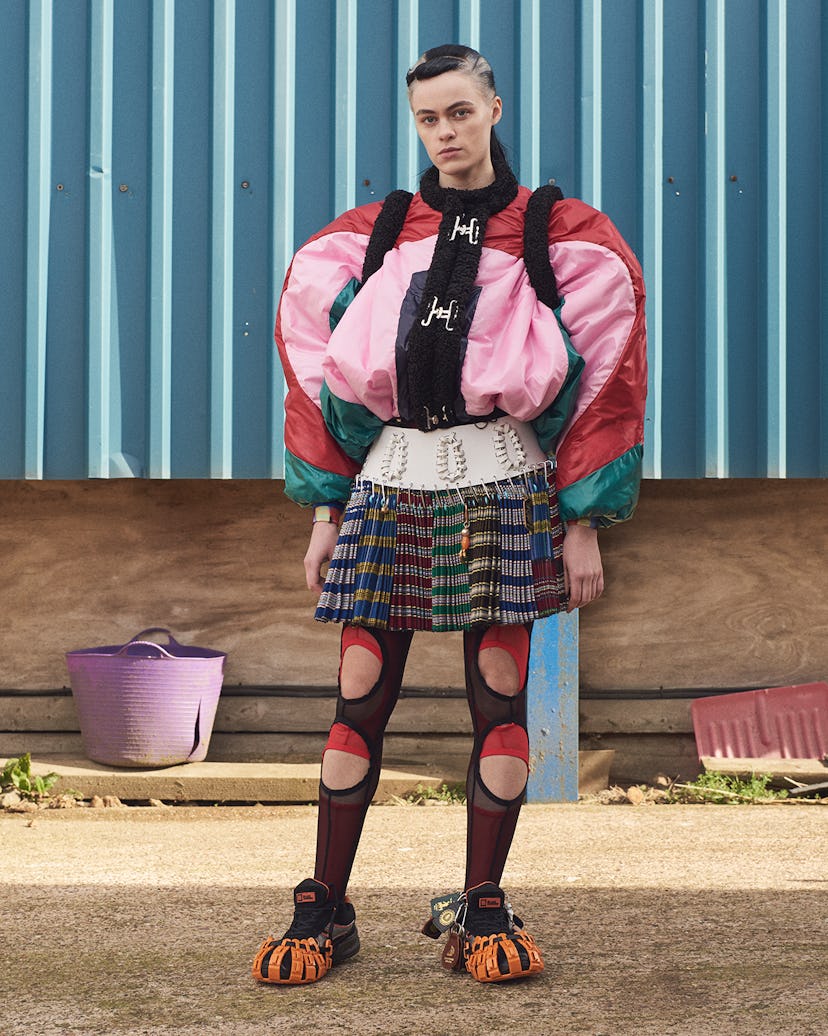Meet Chopova Lowena, the English-Bulgarian Label All the Street Style Stars Are Wearing

For a label that thrives on juxtaposition, it’s fitting that Chopova Lowena, a label dedicated to traditional dress, was discovered on Instagram. Its designers, Emma Chopova and Laura Lowena, are so committed to working with authentic materials and techniques when the luxury e-tailer Matches first came across the pair, they had yet to do sales, let alone figure out retail-style production. Needless to say, it was both a blessing and a curse when Matches sold out their first order of 30 pieces in a day—meaning the pair suddenly had to handmake their request of 25 more.
Chopova and Lowena have since streamlined their process. But unlike most other designers beloved for their DIY sensibilities, their pieces and manufacturing techniques remain entirely authentic—not to mention sustainable, almost without even trying. Two years in, with barely four collections under their belt, they’ve already found a demand in everyone from Dover Street Market to Bulgarian national radio. They made an appearance on the latter two weeks before heading to Paris Fashion Week, where, between showrooms, they got visual proof that this season, their label has also blossomed into an international street style favorite.
All things considered, the latter was almost inevitable: Each Chopova Lowena piece is one-of-a-kind, and yet entirely recognizable. After all, how many people show up to Paris Fashion Week wearing adaptations of traditional Bulgarian designs intended to warm their ovaries?
“The great thing about street style is that it makes these really extreme pieces look so wearable,” Chopova said on the phone from Paris earlier this week. “On an e-shop or on a hanger, it doesn’t always look so easy.”
When she was seven, Chopova left behind her hometown of Sofia for New Jersey. The move only furthered her interest in her heritage, and throughout high school, she dug deeper into Bulgarian folklore. Meanwhile, Lowena was growing up in the U.K.; her upbringing instilled a fascination with old English dress, particularly for children. In 2011, their appreciation for traditional dress intersected on their first day of school at Central Saint Martins in 2011. Little did they know it, but a second first day of school at Central Saint Martins would follow; Chopova and Lowena later became the second duo since Marques’Almeida to joint enroll in the university’s fashion MA program.
Chopova Lowena fall/winter 2019.
These days, the pair is based in South London, but Chopova is making more trips back home to Bulgaria, where the label is also beginning to develop a cult following, than ever. “Women are driving up to her house, opening their boot, and saying, ‘Here’s a boot-load of a fabric you can use,’” Lowena said. “In the beginning, a lot of people started giving us traditional dress for inspiration, and then eventually started giving us fabric as well,” Chopova added. “I think that people really like this side of bringing back that everyone takes so much pride in, because they know that all the fabrics we use essentially end up being garbage.”
To keep up with the demand, Chopova and Lowena have built relationships with “bigger” sellers—like “a guy who finds abandoned factories and has a garage full of saved boxes of buttons and haberdashery and trinkets,” Lowena said. At this point, they’ve made enough of a name for themselves prowling eBay, Etsy, and Bulgarian auction sites that they often don’t even have to seek out materials themselves. “I get loads of messages like ‘I have 100 of these aprons’ every day,” Chopova said. “It’s kind of fun—you get to meet all kinds of people.”
Skirts are their base product, and exemplary of the materials they’re always looking to find: Most are comprised of a wide leather belt with a hefty buckle, which acts as a base for rows of metal carabiners that hang pleats of deadstock fabric, often with a few keychains, keepsakes, and trinkets. Each season, they juxtapose the traditional folk element of their designs with a sportier element, meaning that recycled aprons and handkerchiefs are often paired with sportier materials like spandex, nylon, and lycra. “When we were doing our MA, we learned that sportswear and more utilitarian clothing really balance out all the bulkiness,” Chopova explained.
Research always begins with each exploring their own heritage. So far, Emma’s eastern Europe roots have mostly taken center stage, but for spring/summer 2020, the pair decided to turn words English traditional dress, incorporating Victorian-style wool, tartan, and deadstock taffeta with references to air sports like paragliding and parachuting, which have taken over from equestrian vaulting as this season’s sportier side.
Chopova Lowena has yet to stage a runway show, opting to shoot arresting campaign imagery and look books that double as printed flip books instead. (For fall/winter 2019, for example, Charlotte Wales photographed their collection on members of Great Britain’s equestrian vaulting team.) Their spring/summer 2020, air sports-themed campaign won’t be out for a few more weeks, but rest assured, it’ll be just as adventurous as—and even more airborne than—the last. “I’d love to parachute,” Chopova said. She knows full well that her dream might soon become a reality: “I mean, last campaign, both of us stood up on a horse.”
Chopova Lowena’s fall/winter 2019 campaign.
Related: London Fashion Week’s Street Style Stars Are a Study in How to Dress for Fall